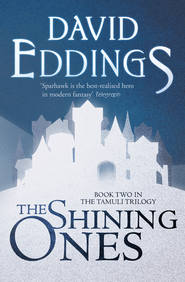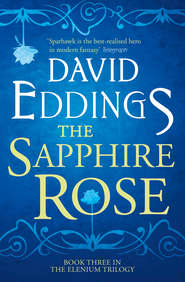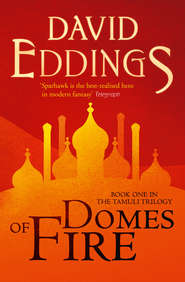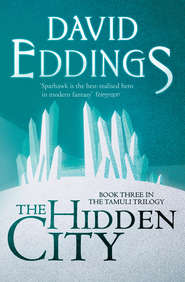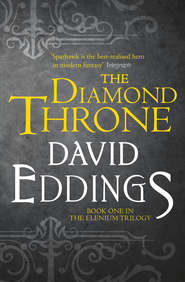По всем вопросам обращайтесь на: info@litportal.ru
(©) 2003-2024.
✖
The Rivan Codex: Ancient Texts of The Belgariad and The Malloreon
Автор
Год написания книги
2018
Настройки чтения
Размер шрифта
Высота строк
Поля
‘I see,’ I said.
‘The world has changed much, I think.’
‘It’s possible.’
‘I might come back some day.’
‘As you wish,’ I said.
‘Goodbye, then,’ she said, blurred into the form of an owl again, and with a single thrust of her great wings she was gone.
Strangely, I missed her. I found myself turning often to show her something. She had been a part of my life for so long that it somehow seemed that she would always be there. I was always a bit saddened not to see her in her usual place.
And then there came a time when, on an errand for my Master, I went some leagues to the north. On my way back I came across a small, neatly thatched cottage in a grove of giant trees near a small river. I had passed that way frequently, and the house had never been there before. Moreover, to my own certain knowledge, there was not another human habitation within five hundred leagues. In the house there lived a woman. She seemed young, and yet perhaps not young. Her hair was quite tawny, and her eyes were a curious golden color.
She stood in the doorway as I approached – almost as if she had been expecting me. She greeted me in a seemly manner and invited me to come in and sup with her. I accepted gratefully, for no sooner did she mention food than I found myself ravenously hungry.
The inside of her cottage was neat and cheery. A fire burned merrily upon her hearth, and a large kettle bubbled and hiccuped over it. From that kettle came wondrous smells. The woman seated me at the table, fetched me a stout earthenware plate and then set before me a meal such as I had not seen in hundreds of years. It consisted, as I recall, of every kind of food which I liked most.
When I had eaten – more than I should have probably, since as all who know me can attest, good food was ever a weakness of mine – we talked, the woman and I, and I found her to have most uncommon good sense. Though my errand was urgent, I found myself lingering, thinking of excuses not to go. Indeed, I felt quite as giddy as some adolescent in her presence.
Her name, she told me, was Poledra. ‘And by what name are you known?’ she asked.
‘I am called Belgarath,’ I told her, ‘and I am a Disciple of the God Aldur.’
‘How remarkable,’ she said, and then she laughed. There was something hauntingly familiar in that laugh.
I never learned the truth about Poledra, though of course I had suspicions.
When the urgency of my errand compelled me to leave that fair grove and the small, neat cottage, Poledra said a most peculiar thing. ‘I will go along with you,’ she told me. ‘I was ever curious.’ And she closed the door of her house and returned with me to the Vale.
Strangely, my Master awaited us, and he greeted Poledra courteously. I can never be sure, but it seemed that some secret glance passed between them as if they knew each other and shared some knowledge that I was unaware of.
I had, as I say, some suspicions, but as time went on they became less and less important. After a while, I didn’t even think about them any more.
That following spring Poledra and I married. My Master himself, burdened though he was with care and the great task of preparing for the day of the final struggle between good and evil, blessed our union.
There was joy in our marriage, and I never thought about those things which I had prudently decided not to think about; but that, of course, is another story.
(#litres_trial_promo)
I THE HOLY BOOKS (#ulink_a24e87f8-f095-503e-9f84-1da1ec266518)
THE BOOK OF ALORN (#ulink_85a013c2-cc53-56de-ab49-8f816874869c)
(#litres_trial_promo)
Of the Beginnings
NOTE The myths of the Alorns describe a time when men and Gods lived together in harmony. This was the time before the world was cracked and the eastern sea rushed in to cover the land where they dwelt, a country which lay to the east of what is now Cthol Murgos and Mishrak ac Thull.
The cracking of the world is known in Alorn mythology as ‘the sundering’ or ‘the dividing of the peoples’, and their count of time begins then.
At the beginning of days made the Gods the world and the seas and the dry land also. And cast they the stars across the night sky and did set the sun and his wife, the moon, in the heavens to give light unto the world.
And the Gods caused the earth to bring forth the beasts, and the waters to bud with fish, and the skies to flower with birds.
And they made men also, and divided men into Peoples.
Now the Gods were seven in number and were all equal, and their names were Belar, and Chaldan, and Nedra, and Issa, and Mara, and Aldur, and Torak.
Now Belar was the God of the Alorns, and dwelt with them and loved them, and his totem is the bear.
And Chaldan was the God of the Arends, and he dwelt with them and was judge over them, and his totem is the bull.
And Nedra was God over the people who called themselves after his name, the Tolnedrans, and he cherished them and accepted their worship, and his totem is the lion.
And Issa was God over the snake people, and he accepted their dull-eyed worship, and his totem is the serpent.
And Mara was God over the Marags, which are no more, and his totem was the bat, but his temples are cast down and vacant, and the spirit of Mara weeps alone in the wilderness.
But Aldur was God over no people, and dwelt alone and considered the stars in his solitude. But some few of the people of the other Gods heard of his wisdom and journeyed unto him and besought him to allow them to stay with him and be his pupils. And he relented and allowed it to them, and they became his people and joined in brotherhood to learn at his feet, and his totem is the owl.
And Torak is God over the Angaraks, and sweet to him was their adulation and their worship and the smell of the burning of their sacrifices. And the Angaraks bowed down before Torak and called him Lord of Lords and God of Gods, and in the secret places of his heart Torak found the words sweet. And behold, he held himself apart from the fellowship of the Gods and dwelt alone in the worship of the Angaraks. And his totem is the dragon.
And Aldur caused to be made a jewel in the shape of a globe, and behold, it was very like unto the size of the heart of a man, and in the jewel was captured the light of certain stars that did glitter in the northern sky. And great was the enchantment upon the jewel which men called the Orb of Aldur for with the Orb could Aldur see that which had been, that which was, and that which was yet to be – yea, verily, even that which was concealed even though it were in the deepest bowels of earth or in darkness most impenetrable. Moreover, in the hand of Aldur could the jewel cause wonders no man or God had yet beheld.
And Torak coveted the Orb of Aldur for its beauty and its power, and in the deep-most crevasses of his soul resolved he to own it even if it came to pass that he must slay Aldur that it might be so. And in a dissembling guise went he even unto Aldur and spake unto him.
‘My brother,’ said he, ‘it is not fit that thou absent thyself from the company and the counsel of thy brothers. I beseech thee that thou takest unto thyself a people and return to our company.’
And Aldur looked upon Torak his brother and rebuked him, saying, ‘It is not I who have turned from the fellowship and sought lordship and dominion.’
And Torak was shamed by the words of Aldur, his brother, and was made sore wroth, and rose he up against his brother and smote him and reached forth his hand and took from his brother the jewel which he coveted, and then he fled.
And Aldur went unto the other Gods and spoke with them of what had come to pass, and the Gods rose up, and each of them besought Torak that he return the Orb to Aldur, but he in no wise would do it. And thus it came to pass that the Gods caused each his own people to gird themselves for war.
And behold, Torak did raise the Orb of Aldur and did cause the earth to split asunder, and the mountains were cast down, and the sea came in and did engulf the lands of the east where the people of the Gods dwelt. And the Gods took their people and fled from the great inrushing of the sea, but Aldur and Belar joined their hands and their wills and did cause mountains to rise up to set limits upon the sea which had come in. And the Gods were parted one from the other, and the people also. And men began to reckon time from the day in which Torak caused the seas to come in.
Now it came to pass that the six Gods went even unto the west with their people, but Torak took the Angaraks unto the east, and the sea that had rushed in separated the Angaraks from the other peoples.
Not without hurt, however, did Torak crack the earth, for such was the virtue of the Orb that in the day when Torak raised it against the earth and against the mountains did the Orb begin to glow. Faint at first, the fire of the Orb waxed stronger with each of the commands of Torak. And the blue fire of those distant stars seared the flesh of Torak. In pain did he cast down the mountains. In anguish did he crack the earth asunder. In agony did he let in the seas. And thus did the Orb of Aldur requite Torak for putting its virtue to evil purpose – Behold, the left hand of Torak was consumed utterly by the fire of the Orb, and like dry twigs did the fingers thereof flare and burn down to ashes. And the flesh on the left side of Torak’s face did melt like wax in the holy fire of the Orb, and the eye of that side did boil in its socket.
(#litres_trial_promo)
And Torak cried out a great cry and cast himself into the sea to still the burning which the Orb had caused, but it availed him not. Truly it is written that the pain of Torak which the Orb had caused in punishment will endure until the end of days.
And the Angaraks were dismayed by the anguish of their God, and they went unto him and asked what they might do to end his pain.







